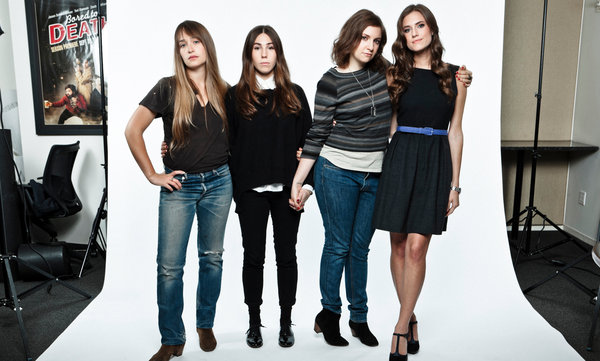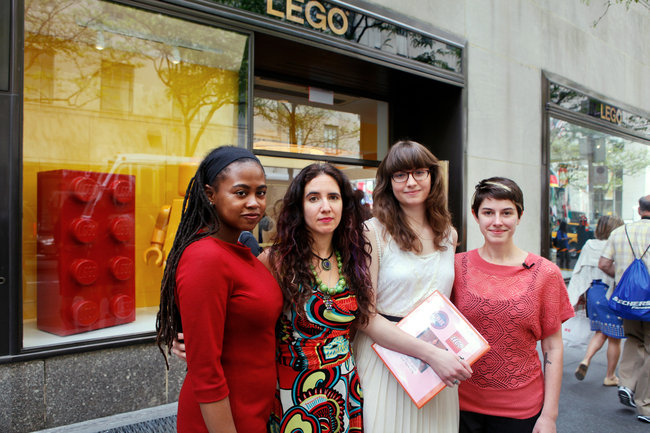|
of Feminism? |
||||
By GINIA BELLAFANTE April 21, 2012  Chad Batka for The New York Times SISTERHOOD The cast of the HBO series “Girls.” For many women, there are certain cultural critics who are like heat waves. Their polemical expeditions are forgettable between occurrences but stultifying in the instance and show no signs of letting up. They veer toward the specious, speculative art of the trend story. Sex, gender and domestic habit make up their range of interest, and whenever a relevant cultural sensation comes along, they can be counted on to tell us why we’re all worked up. Last week, women across the city took to the Internet to attack Katie Roiphe for an article she wrote in Newsweek examining the phenomenon that “Fifty Shades of Grey” has become. The book, by an English matron, E. L. James, recounts a sadomasochistic affair between an innocent college student and an astonishingly rich executive. Though it might be possible to read the text as a seditious wealth fantasy — all the self-erasure that goes into accessing the world of the 0.01 percent — Ms. Roiphe took a different course. What made people angry was her supposition that the book’s appeal, together with the arrival of “Girls” on HBO and some dubious research from Psychology Today, suggests that career women, bored by all the cultural swagger they’re allegedly wielding, long to be sexually dominated. What career women want — the words alone cause recoiling. The premise that they want to be spanked is one with which Ms. James herself does not even seem to comply. “I think in real life, it’s very, very different,” she told the “Today” show Tuesday. “You want someone who does the dishes.” Whatever the subject under Ms. Roiphe’s review — be it “Mad Men,” or last year’s bedtime-story satire “Go the — to Sleep” or, now, “Fifty Shades of Grey” — she inevitably unearths the same collective fantasy, rendered with style and no variation. You may walk around believing that what you want is a 5 percent merit raise, or a three-week vacation or 200 additional square feet of apartment space, but what you really crave is a life of unchecked erotic license — of office flirtations that go somewhere, of late nights in cabs with strangers, of fanny-pinching and a little bit of the rough chaos of whips and leather. The “you” here is an iteration of a particular journalistic cliché — the married, ambitious, overscheduled New Yorker whose submission to a dreary life of child-centeredness and farmers’ markets is threatening to secure her annihilation. For those who favor commitment and, as she once put it, “hand-cured pancetta,” Ms. Roiphe harbors a kind of imperious, existential worry. Ms. Roiphe came of professional age, as I did, in the Spy magazine New York of the 1990s, when earnestness and, by extension, the well-intentioned concerns of the women’s movement were distinctly out of fashion. For many of us, our engagement with feminism was enacted at the level of motherhood wars, and debates about the complexities and relevance of the erotic imagination. It is hard to conclude that the world became a more hospitable place because of it. But do young women coming up in the city today hold a similar apprehension about an allegiance to old archetypes of female power? To grievances about equal pay or ideas about the perils of exploitive media images? Or have they achieved sufficient distance to reclaim this territory? There seems to be evidence to suggest that they have, as teenage girls here and across the country continue to devour “The Hunger Games,” with its omnipotent, physically exhilarating “Wonder Woman” heroine, Katniss Everdeen.  Members of Spark, left to right, Jamia Wilson, Dana Edell, Stephanie Cole and Bailey Shoemaker Richards. “Girls,” the prodigiously acclaimed comedy about women of post-college age living in Brooklyn, would seem to warrant mention here, as well. Far from glamorizing sex with egregious power imbalances, the show explores sexual abjection as the penalty the culture exacts on the average-looking woman for the offense of her averageness. It’s a radical idea, really, as if culled from the pages of a ’70s manifesto. On the show, the creator and star, Lena Dunham, 24, juxtaposes the fate of her own fleshy and unkempt alter ego, joylessly bossed about by a sexual narcissist, against the fate of a friend whose beauty ensures her an overly solicitous romantic attachment. That this attractive woman grows bored with her boyfriend — in the manner of the wealthy getting weary of their yachts and their lobsters — is more inevitability than subversion. I recently learned about an activist group called Spark in the world of real-life youthful Brooklyn, a collective of girls spanning age 13 to their early 20s who have bound together to fight retrograde sexual and gender stereotyping. Members surreptitiously place Post-it notes in stores, on toys and games they deem questionable. Beginning in late December, when Lego was about to release its first girl-specific building set, called Friends, which succumbed to the familiar purple and pink and heart-shaped fantasia, Spark began a petition that has claimed 55,000 signatures. On Friday, four of its representatives were scheduled to meet with executives from the Danish company in a Manhattan hotel room to air their concerns. For years Lego had been praised for creating gender-neutral toys. But in Friends, its characters include, in addition to the token science nerd, a lover of party planning. “I’d played with Legos my whole life,” Bailey Shoemaker Richards, 22, one of the leaders of the protest, told me. “I saw this, and I wasn’t thrilled.” So she didn’t merely write something. She did something. E-mail: bigcity@nytimes.com |
||||